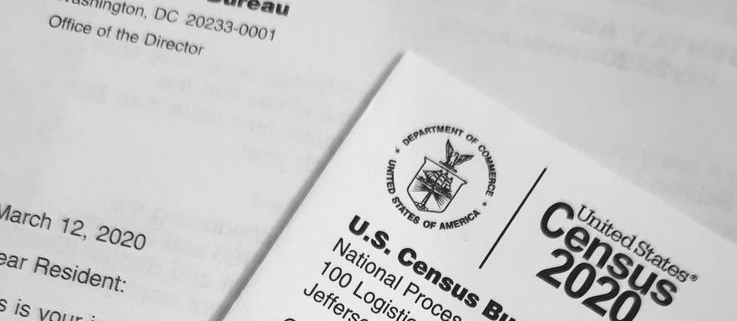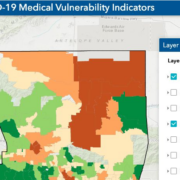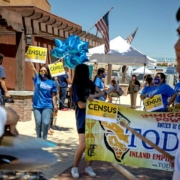Reliable, accurate and complete count for 2020 Census is at risk
UCLA study forecasts a severe undercount for people of color, immigrants and low-income individuals
A UCLA report published today shows that the 2020 Census will severely undercount immigrants, low-income people and people of color.
Two key reasons are the COVID-19 pandemic and a directive issued July 21 by the Trump administration to cut population data collection operations short by one month; the Census Bureau must now end field data collection by Sept. 30.
To date, 93 million households, nearly 63% of all households in the U.S. have responded to the 2020 Census. In 2010, 74% of households in the United States filled out and mailed back their 2010 Census questionnaires, matching the final mail participation rate of the 2000 Census.
The White House directive and the public health crisis have made it an enormous challenge for the Census Bureau to ensure a complete and fair enumeration for the 2020 Census, according to the researchers. They write that racial and economic class biases threaten and undermine the goals of equal political representation and just allocation of resources.
The new analysis (PDF), by researchers from the UCLA Center for Neighborhood Knowledge, the UCLA Asian American Studies Center and Ong & Associates, uses U.S. Census Bureau COVID Tracking Project data as of Aug. 1, and updates a previous UCLA report that analyzed self-response rates as of June 1.
The current report examines changes from 2010 to 2020, and the spread between tracts with high response rates and tracts with low response rates. While the overall response gap from 2010 to 2020 has closed to three to four percentage points as of Aug. 1, some communities have experienced more barriers to participating. Low-income and minority neighborhoods had lower response rates in 2010 than more advantaged neighborhoods, and that gap has only widened in 2020.
“It is highly likely and unfortunate that the 2020 Census will be flawed with severe undercounts of people of color and low-income individuals,” said Paul Ong, co-author of the report and CNK director at the UCLA Luskin School of Public Affairs. “At this juncture, it is critically important to start developing methods to adjust the counts to develop a more accurate statistical picture of America and its people.”
Ong is also the founder of Ong & Associates, which provided its research services pro bono for the report.
The report results show that neighborhoods with high concentrations of Asian, Black, Hispanic and Indigenous populations experienced a greater decline in response rates relative to non-Hispanic white neighborhoods, when comparing 2010 and 2020 response rates. The estimated median response rates are 69.1% for non-Hispanic white, 66.7% for non-Hispanic Asian, 49.7% for non-Hispanic Black and 50.1% for Hispanic.
The research reveals that Hispanic (12.7%) and Indigenous (12.3%) people have the largest temporal gap from 2010 to 2020. What is particularly dramatic is the decline for Hispanic neighborhoods, which may be attributable to the stigma and fear associated with the controversial attempt to include a citizenship question on the 2020 census form. Moreover, the pandemic appears to have created more barriers to participation for non-English speaking households and/or those without good internet connections.
The report finds that 2020 Census response rates vary systematically with economic class, ranging from 73.2% for the most affluent neighborhoods to 47.4% for the poorest neighborhoods. When comparing 2010 and 2020 Census response rates, the gaps also vary systematically by economic class, ranging from a less than one percentage point decline for the most affluent to a nine-percentage point decline for the poorest.
On April 18, the New York Times reported that the COVID-19 crisis had seriously hampered self-reporting, causing the Census Bureau to adjust its timeline and initially prolong the collection process to counter any shortfalls. The data collection period was extended from mid-August to October 31, but the recent White House directive will cause operations to end one month sooner.
The report points out that lower self-response rates will generate disproportionately more homes that must now be visited during an abbreviated — and labor-intensive — non-response follow-up phase. This will add great strain to the Census Bureau’s limited budget and resources, and add an overwhelming burden on Census workers, community-based organizations and other stakeholders participating in 2020 Census outreach efforts.
According to the authors, COVID-19 further compounds the challenges by creating barriers to face-to-face contacts because of a continued need for social distancing and other public-health precautions. Finally, the systematic low self-response rates in disadvantaged neighborhoods compound the problems because these are the same neighborhoods most affected by COVID-19.
The challenge that lies ahead is how the nation will address a seriously flawed enumeration, one with a significant overall undercount and differential undercount that will disproportionately hurt the poor and people of color, the researchers warn.
The authors recommend developing data and methods that enable researchers and statisticians to adjust the count and produce a more accurate and unbiased numerical picture of America and its people. The Census Bureau’s post-enumeration study will help, but it is also critically important for academic researchers to develop independent approaches.
“An adjustment is fundamental to ensuring fair political representation, just resource allocations, and social equality,” the researchers write.
Media Contact
Melany De La Cruz-Viesca
E: melanyd@ucla.edu
P: 310-825-2974
The Center for Neighborhood Knowledge (CNK) conducts basic and applied research on the socioeconomic formation and internal dynamics of neighborhoods, and how these collective spatial units are positioned and embedded within regions. We work with a broad set of data to examine neighborhood phenomena across time and space. It is our hope that they might act as tools for community members, leaders, and organizations to inform and empower. The center is housed in the UCLA Luskin School of Public Affairs.
Established in 1969, the UCLA Asian American Studies Center has been at the forefront of producing and disseminating knowledge of the lives of Asian Americans and Pacific Islanders through research, archival and film documentation, publications and civic engagement. AASC is a national research center advancing historical, transformative and interdisciplinary scholarship by bridging research with community voices.
Ong & Associates is an economic and policy analysis consulting firm founded by Paul Ong that specializes in public interest issues; the firm provided services pro bono for the study.






 Stockton, California. Wayne Hsieh | FlickrCC
Stockton, California. Wayne Hsieh | FlickrCC 




Leave a Reply
Want to join the discussion?Feel free to contribute!